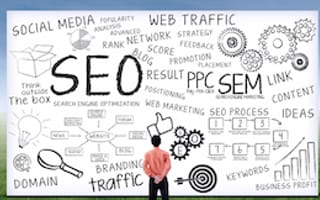[ibimage==48040==Original==none==self==ibimage_align-center]
Because of the high speed of innovation in SEO, it can be hard for anyone to distinguish between what’s fact and what’s fiction. What was best practice yesterday may be outdated, counterproductive, or totally useless today. To help us sort through the myths and mayhem of SEO navigation, we connected with Colin Guidi, Director of SEO at 3Q Digital, one of Chicago’s digital marketing innovators.
Myth #1: SEO is only about keywords and the organic landscape
Once upon a time, SEO professionals honed in on on-page elements of the organic landscape, like title tags and meta descriptions, almost exclusively. Throw in a heavy emphasis on link building and you’ve got the antiquated gist of SEO: achieving high placements in results pages.
Nowadays, that job description has become a little more robust. Need a little help with your email marketing or someone for UX or competitive research? “SEOs in 2015 (and years prior) do it all,” said Guidi. “We’re brand ambassadors and truly let the clients understand their digital footprint and exposure.”
[ibimage==48042==Original==none==self==ibimage_align-left]
Myth #2: Coming in at number one is the be-all and end-all
A couple of years ago on the SEO scene, a manic race to the top of a search engine’s results page was underway. Today, ranking number one or two in a search result is still important, but new factors in SEO have changed the game ever so slightly.
According to Guidi (pictured left), new updates like PLAs and Google Carousel and Answer Cards can knock down organic results, even at the number one spot, by a peg or two. SEO in 2015 is still beneficial, but its overall value includes far more than simply boosting organic search rankings.
Myth #3: SEO is a one-and-done type of tool
Some companies, according to Guidi, are under the impression that SEO is a “set it and forget it” kind of deal. In other words, they’ll update their site once or twice a year to meet best practices and then ignore content for six or eight months. But that’s not how SEO works best—especially in an age of continual algorithm tweaks and tests.
Instead, SEO is most beneficial when it’s used as an ongoing engagement. That means developing fresh and frequent content updates that work for today and predict the needs of tomorrow.
“Your site content will change,” Guidi said. “You might acquire an offering and need help promoting it. An algorithm update will come along and knock you ship/website off course. SEO should not be reactive but rather proactive.”
Myth #4: SEO tools are just as good as an SEO professional
To be sure, SEO tools are great when they are used as just that—a tool to help with tracking, management, and metrics analysis. However, if that tool becomes the sole vantage point for SEO strategy and implementation, brand managers might find themselves in a bit of a bind.
Guidi said many of these tools will provide best practice recommendations generated by an automated system, which may be limiting at the end of the day. “Tools have no foresight and cannot hypothesize an algorithm change,” he said, “or prepare for an announced one.”
Myth #5: Links for SEO are dead
Once major search engines announced they could rely on social signals as ranking factors, Guidi said that many people immediately started questioning the legitimacy and longevity of links. “After social signals were introduced, people started hypothesizing that they would replace the actual value of HTML links,” Guidi said. “To this day, they have not.”
Guidi thinks search engines overseas might also help perpetuate this myth. At one point, Yandex—the major search engine in Russia—stopped considering links in their algorithm altogether. But as SEO continues to place more focus on link quality rather than quantity, attitudes toward links have changed. “In 2015, [Yandex] actually reintroduced links to their ranking algorithm to help surface quality content.”
Links, it seems, are still critical in SEO. As penalties given out to overzealous linking become more commonplace, quality links become even more significant in the drive for quality traffic. “Letting links accumulate naturally on your pages through content exposure is perfectly fine,” he said.
Do you know a tech startup that deserves coverage? Email us via [email protected].





.jpg)
